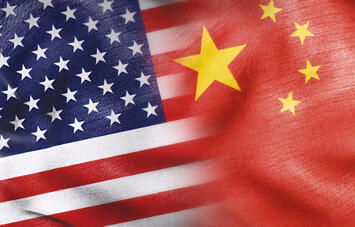
Media coverage of world events focuses on one crisis at a time, as if each was a separate phenomenon. But Ukraine, the Israel-Hamas war, the assaults on shipping in the Red Sea, China’s threats on Tawain, the closing of the Red Sea by Yemen’s Houthis, and even Venezuelan plans to conquer much of oil-rich Guyana are not separate events, but highly related.
All follow patterns laid out in Samuel Huntington’s 2011 book, The Clash of Civilizations and the Remaking of World Order which predicted the rise of “revanchist” powers seeking to recover perceived past glory. The most critical struggle will be with China, whose stated aim is to emerge as the leading global superpower by 2050. Yet China’s rise as a totalitarian surveillance state is just one part of the ascendency of autocrats who seek to topple the long-standing liberal capitalist order and replace it with something more feudal in nature, essentially a world dominated by absolute rulers and their satraps.
To be sure, each of these malefactors, including China, suffers significant weaknesses that could limit their ambitions and leave an opening for a strong Western response. Yet the West’s current power structure seems to lack the will, much less the way, to fight back. Attacks on innocent civilians, particularly in Europe, and assaults on American military bases and commercial shipping, not to mention the use of social media to undermine Western resolve—most evident with the rise of TikTok—are met with weak responses.
Realpolitik Trumps Moralism
The response to the Ukraine war epitomizes the shifting power dynamic. As the West, particularly the traditionally pacifist Left, has rallied with dollars and heightened emotions to the Ukrainian cause, the rest of the world, including rising economic powers like Vietnam, has showed little interest. Virtually no power outside the West has stood by the Ukrainians, except the democracies of East Asia, notably Japan and South Korea, which now have reason to think they too will be abandoned eventually by the West as well.
Many countries have benefited from the war as Russian resources, notably oil, flow to their economies at reduced rates. China uses Russia’s oil, and that of allied states like Iran, to build the world’s most formidable industrial economy. Seeking a way around sanctions on Russia, China uses its considerable financial leverage to develop an alternative credit card system and lead a growing movement away from dollar dominated commercial transactions to ones based on currencies such as the yuan.
Read the rest of this piece at American Mind.
Joel Kotkin is the author of The Coming of Neo-Feudalism: A Warning to the Global Middle Class. He is the Roger Hobbs Presidential Fellow in Urban Futures at Chapman University and Executive Director for Urban Reform Institute. Learn more at joelkotkin.com and follow him on Twitter @joelkotkin.
Photo: US and China flags, via Wikimedia under CC 4.0 License.












